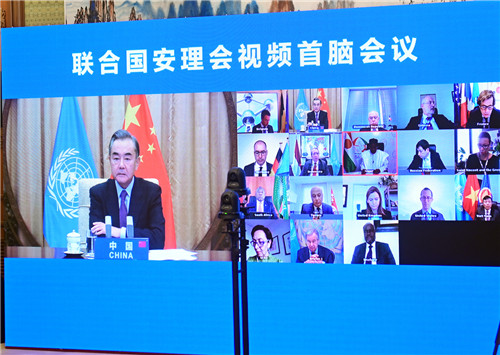改革完善全球治理體系 攜手構(gòu)建人類命運共同體
Improving the Global Governance System Through Reform and Joining Hands to Build a Community with a Shared Future for Humankind
——國務(wù)委員兼外交部長王毅在聯(lián)合國安理會“維護國際和平與安全:新冠肺炎疫情后的全球治理”首腦會議上的發(fā)言
– Remarks at the Summit Debate on the Theme “Maintenance of International Peace and Security: Post COVID-19 Global Governance”
中華人民共和國主席習(xí)近平特別代表、國務(wù)委員兼外交部長 王毅
H.E. Wang Yi, Special Representative of H.E. President Xi Jinping and State Councilor and Foreign Minister of the People’s Republic of China
2020年9月24日,北京
Beijing, 24 September 2020

主席先生,
秘書長先生,
Mr. President,
Mr. Secretary-General,
今年是聯(lián)合國成立75周年。伊素福總統(tǒng)倡議安理會舉行首腦會議,討論新冠肺炎疫情后的全球治理問題,中方表示歡迎和支持。
As the world commemorates the 75th anniversary of the United Nations, the Security Council is holding this summit debate, proposed by President Mahamadou Issoufou, to discuss post-COVID-19 global governance. China welcomes and supports this initiative.
前不久,中國國家主席習(xí)近平出席聯(lián)合國成立75周年紀念峰會和第七十五屆聯(lián)大一般性辯論,從長遠的戰(zhàn)略高度以及寬廣的歷史緯度,回答了人類面對什么樣世界、世界面對什么樣中國、我們需要什么樣聯(lián)合國等一系列重大問題,呼吁各方堅定不移走多邊主義道路,維護以聯(lián)合國為核心的國際體系,共同構(gòu)建人類命運共同體和新型國際關(guān)系。各國領(lǐng)導(dǎo)人也回顧了聯(lián)合國初心使命,發(fā)出維護多邊主義的有力聲音,展現(xiàn)了團結(jié)戰(zhàn)勝疫情、共謀和平發(fā)展的共同意愿。
In his speeches earlier this week at the high-level meeting to commemorate the 75th anniversary of the UN and the General Debate of the 75th Session of the UN General Assembly, President Xi Jinping addressed a series of key questions from a strategic, long-term and historical perspective - What kind of world will we humanity live in? What kind of country will China look like? And what kind of UN is needed for the world? The answers, as President Xi underlined, lie in the steadfast commitment to the path of multilateralism and to the UN-centered international system, and joint efforts to build a community with a shared future for humankind and a new type of international relations. Many leaders have also recalled the founding missions of the UN, expressed strong support for multilateralism and displayed a shared aspiration for defeating COVID-19 with solidarity and pursuing peace and development.
當(dāng)今世界面臨的威脅和挑戰(zhàn)層出不窮,迫切需要完善全球治理,加強協(xié)調(diào)合作。同時,發(fā)展中國家群體性崛起,全球治理體系需要反映國際政治現(xiàn)實,體現(xiàn)多極化發(fā)展進程。為此,我們應(yīng)順應(yīng)時代潮流,加強頂層設(shè)計,改革和完善全球治理體系。中方提出5點建議。
The world today is confronted by myriad threats and challenges, whose solution urgently requires improved global governance and closer coordination and cooperation. Meanwhile, given the collective rise of developing countries, the global governance system needs to reflect this reality of international politics and the process of multi-polarization. We need to follow the trend of the times, strengthen top-level design and improve the global governance system through reform. To this end, China would like to propose the following five points.
第一,踐行共商共建共享原則。國家不分大小,都是國際社會平等成員。重大風(fēng)險挑戰(zhàn)沒有邊界,各國前途命運息息相關(guān)。應(yīng)對風(fēng)險挑戰(zhàn),需要匯聚全球資源,汲取各方智慧,形成強大合力。全球事務(wù)要由大家一起商量,治理體系要由大家一起建設(shè),治理成果要由大家一起分享,讓各國成為世界和平與發(fā)展的參與者、貢獻者、受益者。發(fā)展中國家面臨更多困難,傾聽他們的聲音,尊重他們的訴求,維護他們的權(quán)益,既是現(xiàn)實需要,也是國際道義所在。
First, we need to act on the principle of extensive consultation, joint contribution and shared benefits. All countries, big or small, are equal members of the international community. Major risks and challenges respect no borders and impact the future of each and every country alike. To tackle them requires strong synergy supported by a global pooling of resources and wisdom. Global affairs must be discussed by all, governance systems built by all, and benefits of governance shared by all, so that every country is a participant, contributor and beneficiary of world peace and development. Developing countries are faced with greater difficulties. There is every need to make sure that their voices are heard, their concerns are respected and their rights and interests are safeguarded, which is an embodiment of international justice.
第二,共同應(yīng)對非傳統(tǒng)安全威脅。進入21世紀,從“9·11”事件到國際經(jīng)濟金融危機,再到這場疫情,人類經(jīng)歷了一次次全球性風(fēng)險挑戰(zhàn)。我們要統(tǒng)籌應(yīng)對傳統(tǒng)安全和非傳統(tǒng)安全威脅,把公共衛(wèi)生、氣候變化等置于國際議程中更加重要的位置。非傳統(tǒng)安全威脅牽涉方方面面,需要統(tǒng)籌兼顧、綜合施策、標(biāo)本兼治。安理會應(yīng)該恪守聯(lián)合國憲章宗旨和原則,發(fā)揮更大作用。
Second, we need to jointly tackle non-traditional security threats. The first two decades of the 21st century have seen the onset of numerous global risks and challenges, from the September 11 attacks to the global financial crisis to COVID-19. Traditional and non-traditional security threats should be managed holistically. Public health and climate change should be given greater priority on the international agenda. Non-traditional security threats, often multifaceted, can only be effectively tackled with comprehensive, well-calibrated efforts to address both the symptoms and root causes. Here is where the Security Council needs to play a bigger role pursuant to the purposes and principles of the UN Charter.
第三,加強大國協(xié)調(diào)合作。完善全球治理,大國要發(fā)揮表率作用,帶頭踐行聯(lián)合國憲章,帶頭提供全球公共產(chǎn)品,帶頭為世界和平與發(fā)展作出貢獻。在世界面臨重大風(fēng)險挑戰(zhàn)的時刻,大國更要以人類前途命運為要,摒棄冷戰(zhàn)思維和意識形態(tài)偏見,同舟共濟,攜手應(yīng)對。
Third, we need to enhance coordination and cooperation among major countries. Global governance will be strengthened when major countries set an example of acting on the UN Charter, providing global public goods, and contributing to world peace and development. In such a challenging moment, major countries are even more duty-bound to put the future of humankind first, discard Cold War mentality and ideological bias, and come together in the spirit of partnership to tide over the difficulties.
第四,維護國際法則秩序。構(gòu)建全球治理格局,必須樹立法則意識。要恪守主權(quán)平等、不干涉內(nèi)政、和平解決爭端等國際關(guān)系基本準則,有約必守、有諾必踐。要反對單邊制裁和長臂管轄,維護國際法權(quán)威性和嚴肅性。時代在發(fā)展,法則也要跟上。國際社會應(yīng)該共同推進深海、極地、網(wǎng)絡(luò)、外空等新興領(lǐng)域法則制定,確保新疆域開發(fā)有法可依,公平惠及每個國家。
Fourth, we need to uphold international law and rules. A sound global governance architecture must be undergirded by respect for law and rules. All must adhere to the basic norms governing international relations such as sovereign equality, non-interference in internal affairs and peaceful settlement of disputes. Rules must be followed and commitments be kept. Unilateral sanctions and long-arm jurisdiction need to be opposed in order to safeguard the authority and sanctity of international law. Laws and rules need to keep pace with the changing times. The international community needs to establish rules in frontier areas such as the deep sea, polar region, cyberspace and outer space, to regulate their development and ensure equitable benefits to all countries.
第五,發(fā)揮聯(lián)合國作用。我們面對的全球性風(fēng)險挑戰(zhàn)是復(fù)合型危機,必須綜合加以應(yīng)對。作為最具普遍性、代表性、權(quán)威性的國際機構(gòu),聯(lián)合國比其他國家和國際組織更有資格和優(yōu)勢發(fā)揮領(lǐng)導(dǎo)作用。聯(lián)合國也需要與時俱進,增加發(fā)展中國家代表性和發(fā)言權(quán),提高運行效率和應(yīng)急能力,實現(xiàn)治理體系和治理能力現(xiàn)代化。
Fifth, we need to bring the role of the UN to bear. The global risks and challenges we face are crises with compounded effects, which cannot be addressed separately. As the most universal, representative and authoritative international institution, the UN is better positioned and capable to play a leadership role than any country or international organization. Meanwhile, the body needs to evolve with the times, increase the representation and voice of the developing countries, raise its efficiency and emergency preparedness, and build an up-to-date governance system and capability.
安理會作為集體安全機制的核心,是全球治理體系重要組成部分,承擔(dān)著維護國際和平與安全的首要責(zé)任。新形勢下,安理會要履行好聯(lián)合國憲章賦予的職責(zé),給世界和平以保障,給國際秩序以穩(wěn)定,給各國人民以安全,給全球治理以希望。
The Security Council, the centerpiece of the collective security framework, is part and parcel of the global governance system and tasked with the primary responsibility for international peace and security. Under the new conditions, the Council needs to effectively fulfill the duties conferred by the UN Charter, contribute to the maintenance of world peace and the stability of international order, ensure security to all peoples and bring hope to global governance.
中國愿同世界各國攜手努力,不斷完善全球治理體系,共同推動構(gòu)建人類命運共同體。
China will continue to work with countries around the world to improve the global governance system and build a community with a shared future for humankind.
謝謝。
Thank you.















